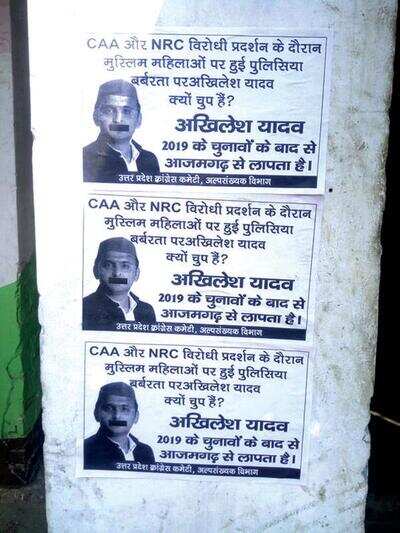
VARANASI: Samajwadi Party swung into action on Saturday after posters cropped up in Akhilesh Yadav’s parliamentary constituency, Azamgarh, questioning his silence on police atrocities on women who participated in protests against the amended citizenship law in Bilariyaganj. Congress’ minority cell leaders had put up the posters.
After meeting residents of Bilariyaganj, where women protesters were evicted in a predawn swoop on February 5, senior SP leader and former minister Ram Murti Verma said, “We don’t take cognizance of Congress and their posters mean nothing to us. We are here to serve people on behalf of our president Akhilesh Yadav. We will submit a report to our party president on police highhandedness on anti-CAA protesters in Bilariaganj.”
Congress put up posters with a photograph of Akhilesh Yadav with sealed lips and a message — Why is Akhilesh silent over police atrocities on Muslim women during anti-CAA protest in Bilariaganj? Another message on the poster stated Akhilesh is missing from Azamgarh after 2019 Lok Sabha election.
The posters appeared on walls of Bilariyaganj on the eve of the visit of a SP delegation led by former minister Durga Yadav to meet those who suffered injuries in police action or were booked. Later, Verma told reporters that Muslim women of Bilariaganj had begun a peaceful protest against CAA and NRC on February 4, but on February 5 police attacked them to crush the agitation. “Nineteen persons were sent to jail and several people were named in the FIR after arbitrary raids on houses,” said Verma.
On February 4, a dharna was staged in Jauhar Ali Bagh Park of Bilariaganj, 17 km from district headquarters. By night, scores of women assembled at the park and indulged in slogan shouting and demanding rollback of CAA and NRC. Though police tried to convince them to leave the place, protesters continued their stir. After midnight, water was discharged into the park to force the protesters to retreat. Finally, the park was vacated around 4am, when police swung into action and arrested 18 persons, including a woman and a cleric, Maulana Tahir Madani.
After meeting residents of Bilariyaganj, where women protesters were evicted in a predawn swoop on February 5, senior SP leader and former minister Ram Murti Verma said, “We don’t take cognizance of Congress and their posters mean nothing to us. We are here to serve people on behalf of our president Akhilesh Yadav. We will submit a report to our party president on police highhandedness on anti-CAA protesters in Bilariaganj.”
Congress put up posters with a photograph of Akhilesh Yadav with sealed lips and a message — Why is Akhilesh silent over police atrocities on Muslim women during anti-CAA protest in Bilariaganj? Another message on the poster stated Akhilesh is missing from Azamgarh after 2019 Lok Sabha election.
The posters appeared on walls of Bilariyaganj on the eve of the visit of a SP delegation led by former minister Durga Yadav to meet those who suffered injuries in police action or were booked. Later, Verma told reporters that Muslim women of Bilariaganj had begun a peaceful protest against CAA and NRC on February 4, but on February 5 police attacked them to crush the agitation. “Nineteen persons were sent to jail and several people were named in the FIR after arbitrary raids on houses,” said Verma.
On February 4, a dharna was staged in Jauhar Ali Bagh Park of Bilariaganj, 17 km from district headquarters. By night, scores of women assembled at the park and indulged in slogan shouting and demanding rollback of CAA and NRC. Though police tried to convince them to leave the place, protesters continued their stir. After midnight, water was discharged into the park to force the protesters to retreat. Finally, the park was vacated around 4am, when police swung into action and arrested 18 persons, including a woman and a cleric, Maulana Tahir Madani.
Trending Topics
LATEST VIDEOS
City
 AAP set to retain Delhi, third term for Kejriwal, predict exit polls unanimously
AAP set to retain Delhi, third term for Kejriwal, predict exit polls unanimously  Delhi CM Arvind Kejriwal hits out at Smriti Irani, says women decide their family vote
Delhi CM Arvind Kejriwal hits out at Smriti Irani, says women decide their family vote  Three-storey building collapses in Punjab's Mohali, several feared trapped
Three-storey building collapses in Punjab's Mohali, several feared trapped  I thank police for arresting AAP worker who used abusive language against me: Alka Lamba
I thank police for arresting AAP worker who used abusive language against me: Alka Lamba
More from TOI
Navbharat Times
Featured Today in Travel
Get the app



